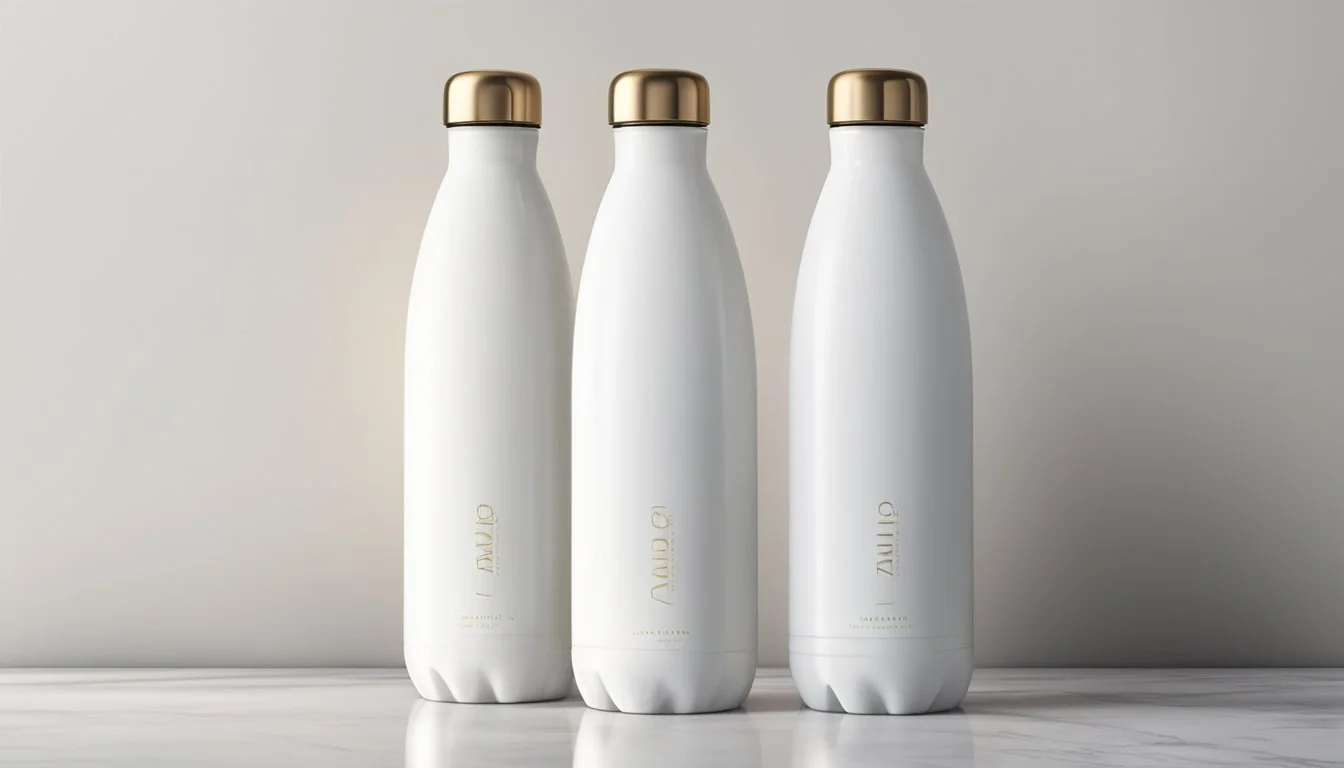Eternal vs. Origin
Comprehensive Comparison of Bottled Water Brands
Deciding which bottled water to choose can feel overwhelming with options like Eternal and Origin available. Both brands offer naturally alkaline water sourced from pristine environments, promising high quality and great taste.
Eternal Water stands out with its naturally occurring springs and balanced mineral content, making it a strong contender for those seeking purity and a refreshing taste. Origin, with its commitment to sustainability and eco-friendly packaging, appeals to environmentally conscious consumers looking for an ethical choice without compromising on quality and hydration.
By comparing these key aspects, this blog post will guide you through the benefits and differences between Eternal and Origin bottled water. Dive in to discover which brand aligns better with your preferences and needs.
Evaluating Water Quality and Benefits
When comparing Eternal and Origin bottled water, key factors such as mineral content, purity, and pH levels play crucial roles in determining the overall quality and health benefits.
Health Impacts of Mineral Content and Purity
Mineral content and purity are critical in assessing bottled water's health benefits. Eternal Water prides itself on naturally occurring minerals like calcium and magnesium. These minerals can support bone health and metabolic processes.
Origin Water, known for its pristine source, emphasizes a high level of purity. The absence of contaminants ensures safety and enhances the water's taste. Both brands undergo rigorous testing to maintain quality standards and customer trust.
Hydration and Electrolyte Balance
Proper hydration is essential for bodily functions, and electrolytes play a significant role in this process. Eternal Water contains naturally occurring electrolytes such as potassium and sodium. These elements help maintain fluid balance and muscle function.
In contrast, Origin Water’s hydration benefits rely more on its clean, pure composition. While it may lack the same level of electrolytes as Eternal, its high purity level ensures optimal hydration without additives. This makes it equally reliable for fulfilling hydration needs.
pH Levels: Alkalinity Versus Acidity
The pH level of water can affect its taste and potential health benefits. Eternal Water boasts an alkaline pH level, typically ranging from 7.8 to 8.2. Alkaline water is believed to neutralize stomach acid and boost metabolism.
Origin Water maintains a neutral to slightly acidic pH, closer to the natural state of water. This balance can be more suitable for those who prefer water without a pronounced alkalinity. Both brands ensure their pH levels remain stable and within safe consumption ranges.
Understanding Water Sources
The origins and purification methods of bottled water can significantly influence its quality and taste. Key factors include the natural sources of the water and the various filtration processes applied.
Natural Springs and Aquifers
Natural springs are primary sources of high-quality spring water. These springs emerge from underground, where water percolates through soil and rock layers, undergoing a natural filtration process. This source typically offers pure, mineral-rich water.
Aquifers also contribute significantly to bottled water, storing large quantities of water underground. These underground springs capture and maintain water purity, often making the water suitable for consumption without excessive treatment.
Purification and Filtration Processes
The purification process in bottled water production varies by brand. Some use minimal filtration, relying on the natural cleanliness of the source. Purified water, such as some brands of bottled water, undergoes extensive filtration processes to remove contaminants.
Spring water from natural sources like Eternal is known for its minimal need for additional purification. Brands may adopt multiple techniques, such as carbon filtration and UV treatment, to enhance water purity without compromising its natural profile.
The Role of Reverse Osmosis
Reverse osmosis is a critical method for ensuring water purity. It involves forcing water through a semi-permeable membrane, which traps contaminants and allows only pure water molecules to pass through. This technique is particularly effective for transforming heavily contaminated water, often associated with tap water, into clean, drinkable water.
While natural water brands may not require reverse osmosis due to the inherent purity of their sources, it remains an essential step for brands using well water or other potentially impure sources. Reverse osmosis ensures that even water from less pristine sources meets high standards of purity and safety.
Analyzing Bottled Water Brands
Understanding the origins, quality, and consumer perceptions of various bottled water brands can guide informed choices. The analysis will focus on two specific brands, provide insights into other notable options, and explore consumer trust.
Comparison of Eternal and Origin Water
Eternal Water sources its water from naturally occurring springs across different locations. It is celebrated for its naturally alkaline properties, which appeal to health-conscious consumers.
Origin Water, on the other hand, emphasizes the purity and pristine source of their water. Origin positions its brand on high standards of quality and consistent pH levels.
Both Eternal and Origin highlight their testing rigor and commitment to quality, though their marketing focuses differ slightly – Eternal emphasizes alkalinity, while Origin leans into purity and tradition.
Other Prominent Brands in the Market
Several other brands provide diverse options for bottled water. Fiji Water is known for its silica-rich profile and artesian source. Icelandic Glacial prides itself on its pristine Icelandic origins. Flow is packaged in eco-friendly cartons and offers naturally alkaline water.
In the mainstream segment, Aquafina, Dasani, and Pure Life deliver purified water options with widespread availability. Evian, Voss, and Mountain Valley feature prominently in the premium market due to their distinctive sources and high mineral content. Smartwater differentiates itself with its vapor-distilled process and added electrolytes.
Consumer Perceptions and Brand Trust
Brand trust often hinges on perceived quality and consistent consumer experiences. Eternal Water receives positive feedback for its refreshing taste and energetic benefits due to alkalinity. Consumers appreciate its transparent sourcing information.
Origin Water also garners trust through its emphasis on purity and meticulous testing. High consumer ratings often cite its clean taste and consistent quality.
Brands such as Evian, Fiji, and Mountain Valley have cultivated strong loyalty. Evian's Alpine source and Mountain Valley's Ouachita Mountains origin resonate well with consumers. Voss’s sleek bottle design and Icelandic Glacial’s unique heritage also contribute to their strong market presence.
Ultimately, consumer perceptions are shaped by a combination of quality, taste, trust, and branding.
Packaging and Environmental Considerations
When comparing Eternal and Origin bottled water, the packaging materials, ecological footprint, and corporate sustainability practices each play crucial roles. This section examines these aspects in detail.
Material Use: Plastic, Glass, and Alternatives
Bottled water is typically packaged in plastic, glass, or alternative materials like paper. Plastic bottles are lightweight and shatter-resistant, but they contribute significantly to environmental pollution. Many plastic bottles are made from polyethylene terephthalate (PET), which is recyclable, though not always recycled. BPA-free plastics are now more common, reducing health concerns.
Glass bottles, although heavier and fragile, are fully recyclable and do not contain harmful chemicals. They also offer a premium feel. Alternative packaging, like Boxed Water, uses paper materials that boast a lower environmental impact and a higher recycling rate compared to plastic.
Ecological Footprint of Water Brands
The ecological footprint encompasses the total environmental impact of sourcing, packaging, and transporting bottled water. Eternal Water, using primarily plastic packaging, has a notable carbon footprint due to plastic production and transportation emissions. Despite being recyclable, the recycling rates for plastic bottles remain low, adding to pollution problems.
Boxed Water and other brands utilizing paper cartons claim a smaller ecological footprint. These cartons are more recyclable than plastic and contribute less to ozone depletion. Glass bottles, while eco-friendlier in terms of recycling, have a higher carbon footprint due to their weight during transportation.
Sustainability and Corporate Responsibility
Both Eternal and Origin brands address sustainability through their corporate practices. Many companies now engage in initiatives like reducing water usage, using renewable energy in production, and supporting recyclability programs.
Eternal Water invests in responsibly sourcing water from sustainable springs and enhances recyclable practices. Meanwhile, Origin partners with environmental organizations to reduce its carbon footprint and supports local communities.
Boxed Water goes further by committing to planting trees and reducing plastic waste. These measures underscore the brands' broader commitment to reducing environmental impacts and promoting sustainability in the bottled water industry.
By understanding these aspects, consumers can make informed choices that align with their values and environmental goals.
Taste and Consumption Experience
When comparing Eternal and Mountain Valley Spring Water, it is important to assess their flavor profiles and user experiences. Both the alkaline properties of Eternal and the pure spring origins of Mountain Valley influence their taste. Let's explore these elements further.
Flavor Profile of Alkaline and Spring Waters
Eternal Water is naturally alkaline, sourced from spring water that filters through volcanic rock. This gives it a smooth, clean taste. Many consumers appreciate the subtle hint of minerals that add to its refreshing quality.
Mountain Valley Spring Water, sourced from the Ouachita Mountains, offers a robust, crisp flavor. This natural spring water has a higher mineral content, which contributes to its notable taste and mouthfeel. Users often describe it as pure and invigorating.
The Role of Water Sommeliers
Water sommeliers play a crucial role in distinguishing subtle differences in bottled water. They evaluate water much like wine, considering factors like source, mineral content, and bottling methods.
Sommeliers often highlight the minerality and alkalinity in Eternal as enhancing its smooth texture. Mountain Valley’s natural minerals from spring sources are frequently praised for their distinct and refreshing characteristics. Their expert insights can guide consumers to appreciate these nuanced differences.
Choosing Water for Personal Preference
Personal preference ultimately dictates the choice between Eternal and Mountain Valley. Those who favor a subtly mineral-infused alkaline water may lean towards Eternal for its smooth and mild flavor.
On the other hand, individuals who prefer a crisp and pronounced taste, with clear notes of minerals, might choose Mountain Valley. It's vital for consumers to try both types of water to determine which complements their palate and hydration needs best.
A side-by-side tasting can help in making an informed decision. Sampling both can reveal which flavor profile is more enjoyable for everyday consumption.
Additional Health Considerations and Alternatives
Consumers looking for the healthiest bottled water options may need to consider various alternatives and additional health factors, particularly the presence of essential minerals and electrolytes.
Electrolyte-Enhanced Waters and Sports Drinks
Electrolyte-enhanced waters, such as Essentia, aim to provide better hydration by adding electrolytes like potassium, sodium, and magnesium. These elements are critical for maintaining fluid balance and muscle function. Sports drinks, including Gatorade, also contain electrolytes but differ by having higher sugar content, which can be a downside for everyday consumption.
While electrolyte water is suitable for general hydration and low-sugar options, sports drinks may be preferable after intense exercise requiring quick energy replenishment. It’s important to check labels for specific electrolyte types and concentrations to match individual health needs.
Calcium and Magnesium: Essential Minerals
Calcium and magnesium are vital minerals often found in natural mineral waters. These minerals contribute to bone health and muscle function. Higher magnesium levels aid in muscle relaxation and reduce cramps, whereas calcium is indispensable for bone density and cardiovascular health.
Water sources like spring and glacier water can naturally contain these minerals. For those concerned about mineral intake, selecting bottled water that specifies calcium and magnesium content can be beneficial. Always compare labels to ensure optimal mineral balance for personal health requirements, as some waters offer minimal mineral content while others are richer in these essential nutrients.
Encapsulating Water Production and Regulation
Understanding how water is produced and regulated is crucial when comparing bottled water brands like Eternal and Origin. This section breaks down their methods and adherence to guidelines to ensure safety and quality.
Production Processes and Standards
Eternal Water sources its product from naturally alkaline springs. The water's high pH balance and mineral-rich composition are preserved by minimal processing. Only filtration is used to remove impurities while maintaining the natural quality and alkalinity of the water.
Origin Water, on the other hand, may involve more extensive processing. Techniques such as micro-filtration, reverse osmosis, and ultraviolet exposure ensure purified water with high purity levels. These processes add electrolytes and ionize the water to achieve a higher pH balance, which mirrors synthetic alkaline water standards.
Compliance with FDA and EPA Guidelines
Both Eternal and Origin adhere to strict FDA and EPA regulations. Bottled water must meet the same safety and quality standards as municipal tap water, despite different regulatory frameworks. The FDA oversees bottled water, ensuring it meets quality and labeling requirements.
Eternal Water complies with these standards by maintaining the natural purity of its spring water. Meanwhile, Origin's adherence includes rigorous purification methods. The EPA ensures that the water sources do not have harmful contaminants, and both brands meet these benchmarks. Every batch undergoes testing to guarantee it remains free from pathogens and contaminants.
Careful attention to production and strict compliance with regulatory standards ensures both Eternal and Origin provide safe, high-quality bottled water to consumers.
Market Analysis and Access
Both Eternal and Origin bottled water brands offer unique market positions that cater to different consumer needs and preferences. Key considerations include availability in grocery stores and the convenience of choosing water that fits various lifestyles.
Availability in Grocery Stores and Retail
Eternal Water is widely available in major grocery stores and retail outlets across the United States. It can be found in prominent chains such as Walmart, Target, and Kroger. These stores often feature Eternal Water in their health and wellness sections due to its naturally alkaline properties.
Origin Water, on the other hand, focuses more on specialty stores and health food markets. While it may not be as ubiquitous as Eternal in large retailers, it has a strong presence in stores like Whole Foods and Sprouts. Its targeted distribution strategy appeals to a niche market seeking premium and health-oriented beverage options.
Choosing Water for Lifestyle and Convenience
For consumers prioritizing convenience, Eternal Water offers a practical choice. It is bottled at the source and available in various sizes, making it suitable for on-the-go hydration. The use of recyclable PET plastic also adds a layer of environmental consideration for eco-conscious buyers.
Origin Water caters to a lifestyle that emphasizes health and sustainability. Packaged in eco-friendly materials, such as bottles made from recycled content, it appeals to environmentally aware consumers. Additionally, Origin's emphasis on purity and mineral content attracts those seeking water that supports a healthy lifestyle.
By analyzing these aspects, consumers can make informed decisions that align with their needs and values.
More About Eternal
Eternal vs Icelandic Glacial: Which Bottled Water is Better?
Eternal vs Kirkland Signature: Which Bottled Water is Better?
Eternal vs Mountain Valley Spring Water: Which Bottled Water is Better?
Eternal vs Richard's Rainwater: Which Bottled Water is Better?
Eternal vs Whole Foods Italian Still Mineral water: Which Bottled Water is Better?






